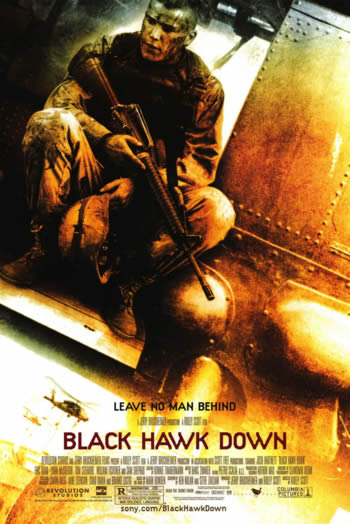Movies

New Releases • A-D • E-H • I-P • Q-Z • Articles • Festivals • Interviews • Dark Knight • Indiana Jones • John Wick • MCU
Black Hawk Down
Directed by Ridley Scott
Rated R
In 1993, Somalia was in a state of anarchy. After commandeering the overthrow of the dictator Mohamed Siad Barre, warlord Mohamed Farrah Aidid found himself at war with other Somali clans. With the country tearing itself apart and plunging into famine, hundreds of thousands of people were dying of starvation. In an attempt to restore order, the United Nations sent in relief troops.

On one mission the troops set out to capture two of Aidid's lieutenants in Mogadishu. What was to be a one-hour raid turned into a nightmare that left 18 American soldiers and hundreds of Somalis dead, plus hundreds more wounded.
That true-life mission is the basis of Black Hawk Down.
The Art of War
Director Ridley Scott (Gladiator) has commented that Black Hawk Down is an anti-war movie. That summation is similar to comments Steven Spielberg made about Saving Private Ryan. These movies do not glorify war, they provide a graphic account of the horrors faced in combat.
Surprising for a production from Jerry Bruckheimer, the man who specializes in gung-ho macho movies like Top Gun and Pearl Harbor, his latest production shies away from slaphappy patriotism. That's only appropriate for a film about a mission that could technically be considered a success because the point of the mission, to capture the two lieutenants, did happen. But the loss of life and the destruction caused in that pursuit forces the value of that success to be questioned.
With images more frightening than anything found in traditional horror movies, Black Hawk Down paints an unrelenting and unforgiving picture of war. These soldiers invaded the inner sections of Mogadishu, where rooftop snipers armed with machine guns and grenade launchers, protected the streets below. The fact that these Somali soldiers were men and children clad in nothing more than blue jeans and tank tops or T-shirts made the unpredictability of their situation all the more perilous.
Tragically, only a mile away was Paki Stadium, the safe zone and military headquarters, where the 10th Mountain Division slowly pulled itself together to rescue fallen soldiers just down the street. However, even in such close proximity, the barricaded city streets and swarms of armed irregulars made the tactics of rescue all the more difficult with the civilian population also on the scene.
Earn This
Screenwriters Steven Zaillian (Schindler's List) and first-timer Ken Nolan avoid tidying up their source material, Mark Bowden's book of the same name, with a traditional narrative structure. Nobody utters, "Earn this" to bring the message home. Why tidy up a messy reality? The movie's power is in the chaos it presents.
At the end, with no easy explanation for what transpired, the ultimate question is "Why?" And in the aftermath of the raids and butchery, the glazed look of all the surviving soldiers asks, "What just happened?"
There's a hollow feeling at the film's end because there are no simple answers. And that's not to fault the movie; it's a gut reaction to the incredible events just witnessed.
All That You Can't Leave Behind
The cast is solid, with strong performances from Josh Hartnett (Pearl Harbor) and the seldom seem Sam Shepard (The Right Stuff). But, with the large ensemble cast, even fine actors like Ewan McGregor (Moulin Rouge) and Tom Sizemore (Saving Private Ryan) take a back seat to the situation at hand.
Unlike Saving Private Ryan, which blended vivid scenes of brutal combat with interludes of character-building camaraderie, Black Hawk Down allows for some initial character sketches and conflict among the different divisions of the United States forces, but the majority of the movie deals with a stunning recreation of the raid on Mogadishu.
In doing so, images are brought to the screen that are not for the squeamish.
Sure, there are moments that beg comparisons to previous war epics like Apocalypse Now, Three Kings, and Saving Private Ryan, but Black Hawk Down has its own story to tell and its own ambitions. It stands solidly alongside those other films.
The hook here is the film's tagline, "Leave no man behind." That is the code among the soldiers and one they execute with unfettered determination.
Yet, this is not a red-white-and-blue movie about American patriotism. Far from it. Even the film's score, by Hans Zimmer (Gladiator) and Mel Wesson (Hannibal) lacks sweeping passages of patriotic fervor. Instead, they combine American rock 'n' roll with a strong score that emphasizes the African culture rather than Uncle Sam.
It all helps add to the feeling of alienation experienced by the soldiers out on unfamiliar ground.
• Originally published at MovieHabit.com.


